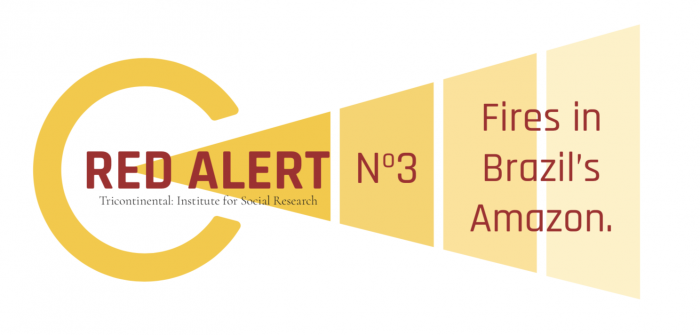TRICONTINENTAL

Roberto Burle Marx, drawing from the Pithecolobium series (1961).
Dear Friends,
Greetings from the desk of the Tricontinental: Institute for Social Research.
At the United Nations General Assembly, Brazil’s Jair Bolsonaro opened the proceedings with the rather bizarre comment that the Amazon – which has been on fire for weeks – is ‘practically untouched’ and that a ‘lying and sensationalist media’ had been fanning the flames of fake news. The Amazon, 60% of which is inside Brazil, is not – Bolsonaro said – the ‘heritage of humankind’. It is Brazilian territory, he said, and if Brazil wants to cut it down, then so be it.
Following Bolsonaro, Trump made some incoherent remarks at the UN about sovereignty and patriotism. While he claimed that he was a nationalist who stood for the sovereignty of nations, Trump openly threatened Iran and Venezuela with war. Their sovereignty was of no consequence to Trump.
My commentary on Democracy Now, 25 September 2019
The antidote to Trump came from the Prime Minister of Barbados – Mia Amor Mottley – who stood with Cuba and Venezuela and who offered a truly powerful statement on the climate catastrophe from the standpoint of the small island states.
Prime Minister Mia Amor Mottley, United Nations, 27 September 2019
Mottley represents reason. Bolsonaro and Trump represent unreason. As part of his speech, Bolsonaro attacked Raoni Metuktire, a leader of the indigenous Brazilian Kayapó people. Bolsonaro said that Metuktire represents foreign governments rather than his own community or Brazilians. NGOs, Bolsonaro said, ‘insist on treating and keeping our Indians as true cavemen’. This is fiery stuff. It is also racist. Chief Raoni, in his composed but sharp manner, responded that Bolsonaro’s war on the Amazon is ‘not just bad for us indigenous people. It is a disaster for all of humanity’.
From our Tricontinental: Institute for Social Research office in São Paulo comes Red Alert #3, a quick primer on the situation grounded in factual documentation and reason. You can download it here and read it below. For a more in depth discussion of the Amazon, read our fourteenth dossier, published in March by our São Paulo office.

Red Alert #3. Fires in Brazil’s Amazon.
What is Going on the Amazon?
On 19 August, the skies over São Paulo, Brazil’s most populated city, went dark in the middle of the afternoon. Debris and smoke from fires in the Amazon clouded the city. These fires had been set on 10 and 11 August by ruralistas in the region of Novo Progresso and Altamira (in the state of Pará). These ruralistas include the big landowners, landed farmers, land grabbers, land dealers, loggers, and – in their most developed form – agribusinesses. On these days, they held ‘Days of Fire’ to demonstrate their support for Brazil’s president Jair Bolsonaro.
The fires raised a global alarm. Inside Brazil, individuals, civil society organisations, political parties, and research institutes – in their different ways – criticised the Amazon fire and its implications. Protests took place around the world against the Amazon fires, since it is well-recognised that the Amazon is one of the major carbon sinks on the planet. If there is 25% deforestation of the Amazon, then the rainforest would have reached a point of no return. At that point, the vegetation loses its capacity to regenerate and would likely devolve from a rain forest into a savannah.
The destruction of the Amazon could lead to higher temperatures and greater climate instability. This is why the Amazon fires became a global issue so quickly.
Tricontinental for more
